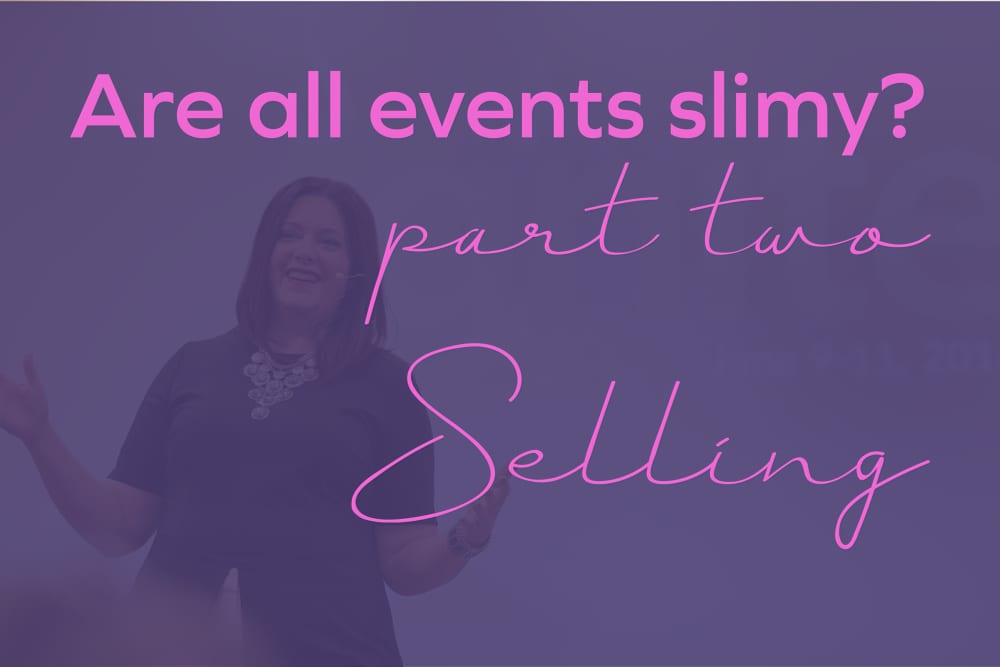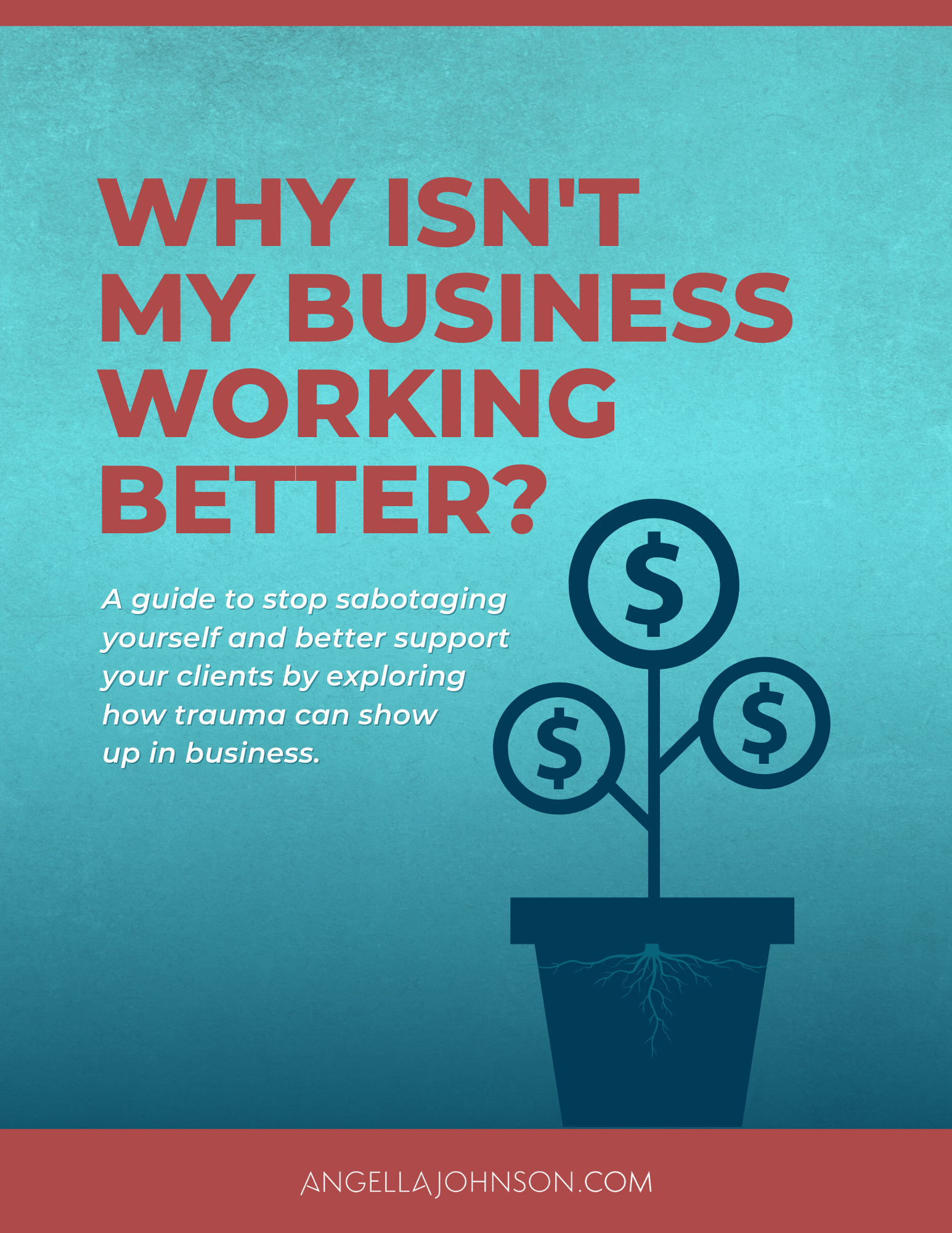If you missed the intro to this article series, check it out here.
Part 1 about speakers is here.
Part 2: Selling at Events
At one of my conferences, I allowed my speakers to sell something less than $200 and they could use the last five minutes of their 50-minute presentation to “pitch.”
A friend of mine later told me that she “heard” my event was just a big sales pitch. Clearly, they had never been to a true pitch fest.
I was happy to let my speakers sell and felt confident that they were focused on providing value. Even though that was my experience, some people felt that was just too salesy.
I share this because I learned that I can never make 100% of the participants happy. One person will criticize the event or speaker while the next person is elated with joy.
Is victimizing event participants the solution to putting more value and integrity into events?
The real problem with these pitch fests isn’t the pitch itself, it’s the participants.
How could I possibly say something so absurd???
After attempting to change the way events hosts were hosting and speakers were selling to be more authentic and getting nowhere, I realized that I cannot change events from the top down. I gave event hosts feedback. I asked= my coaches about their strategies that were more pitch fests than events and was met with a nice pat on the head. It was clear my feedback wasn’t going to change the way these events were being done.
I had to go from the bottom up and from the inside out – in other words, I had to reach the participants of these events and teach them how to do two things:
- Sell with authenticity vs the fear-based bullshit we’ve been taught
- MOST importantly, how to trust themselves and not buy stuff they don’t align with. Notice, I didn’t say to not buy stuff that makes them uncomfortable. Most investments in programs that have changed my life did not make me feel “comfortable,” but it was in alignment for me and there is a big difference.
I also had to implement these things for myself first.
The real problem
The problem isn’t the fact that people are selling, even if their sales pitch is slimy and fear-based.
This is a supply and demand problem. When consumers demand more, the supply will have to change.
If people continue to buy from fear-based manipulative selling then there will be plenty of gurus to deliver that. If consumers stop buying that way, the industry may actually have to change and we are already seeing signs of that change.
(I fully understand that “supply and demand” is not typically used in this way when used to describe consumer-driven economics.)
Participants aka consumers are being more discerning. A lot of us have had to be after some really expensive lessons we’ve made in programs that promise the world and deliver mediocre content at best.
We, as consumers have to take accountability for our choices. What I would really like to see is stop further victimizing people who have unconsciously bought into the sales pitches. By further victimization this process, we perpetuate the problem.
When I hear things like “these poor people” who buy the stuff at these pitch fests, that’s what I mean by further victimizing people.
If someone is complaining or voicing their concern about buying something that they later regret, they CHOSE to ignore their intuition at some point and say yes when they didn’t really mean yes.
Every single time I bought a program, event, or course then later regretted it, I overrode my intuition. My gut instinct was NO and I talked myself into a yes. I bought from a place of fear vs trusting myself.
This problem looks like pulling out your credit card and buying something even though your gut is telling you to get the hell away. But when the salesperson tells you that the pit in your stomach is fear and to not let fear win, it can get tricky. Who do you believe? Your intuition or the “expert?”
Not honoring your intuition is affecting a LOT more than people’s buying decisions at slick events like what I’m talking about here.
It’s also the reason why people stay in abusive relationships, don’t report abuse, vote for politicians who are racist narcissists, trust their doctor more than their own body, don’t send a meal back at a restaurant even when it’s not what they ordered, and I could go on and on.
We are taught that it’s better to be polite and do what the experts tell us than to honor our truth and say no when it’s a no.
The real problem (in my experience) is people don’t trust themselves and collectively, we have been trained to buy shit based on fear and fixing our brokenness.
Here’s the kicker: no one is broken and buying from fear NEVER creates a solution that we are really seeking.
Ask a question instead of buying the blame
So the next time someone complains about buying something then regretting it, ask them something like this, “So what did you learn from that experience?” Or, “It sounds like you learned a really powerful lesson. What clues did that experience give you so you have the ability to say no next time?”
If we allow these unconscious buying decisions to rule our life, we’ll never create beyond it and we’ll keep being a victim to it.
It’s not lost money even though it can appear that way. It’s an expensive lesson but you can create beyond it.
I’ve seen people mortgage their houses. I’ve personally taken money out of retirement to invest in programs. Would I choose that again? Probably not.
Tip for event hosts: Ask your speakers to send you a clip of them selling from stage so you make sure their sales approach fits the energy of your event.
I had one speaker whose content was outstanding and when she got to the offer part of her presentation, the energy completely shifted and I could see that she was going into the guru style that so many of us have been taught.
Even when that happened, I trusted that my attendees were going to choose what worked for them. If they bought because they felt pressured then perhaps that is part of their path that will lead them to only saying yes to what’s true for them.
I saw early on that I couldn’t save people from buying stuff from the gurus who were only there to sell and make money. That’s why I’ve focused so much of my work on empowering and facilitating people to follow their intuition and choose based on what’s true for them vs choosing what’s polite.


